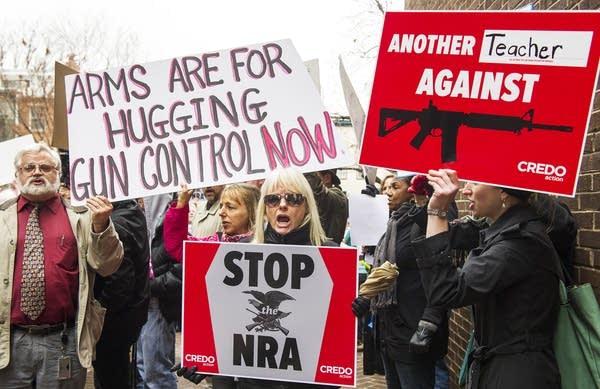Gun laws show difficulty of stemming violent acts

By JULIE PACE and ALICIA A. CALDWELL
Associated Press
WASHINGTON (AP) — One early focus of new gun regulations by President Barack Obama and some lawmakers would reinstate a federal ban on assault weapons, a law widely regarded as imperfect.
The ban, which existed for 10 years until 2004, would have made it illegal for the young gunman in Connecticut to buy the type of 30-round magazines that allowed him to shoot so many elementary school students before he reloaded. But the ban and other U.S. gun laws wouldn't have prevented his mother's purchase of the powerful assault rifle or the especially deadly ammunition that he used to kill 26 people.
A generation of U.S. gun laws — and the inherent compromises intended to balance constitutional gun rights and public safety — reflects the intricacies of applying government policy to stem acts of mass violence.
Create a More Connected Minnesota
MPR News is your trusted resource for the news you need. With your support, MPR News brings accessible, courageous journalism and authentic conversation to everyone - free of paywalls and barriers. Your gift makes a difference.
Since July, there have been at least four mass shootings that killed 47 people and wounded dozens more in Connecticut, Colorado, Oregon and Wisconsin. The killing of 20 children and six adults in a Newtown, Conn., elementary school appears to be a tipping point that pushed Congress and the White House toward tackling new gun laws.
Obama on Wednesday directed Vice President Joe Biden to produce recommendations on new gun laws and pledged to push for them without delay.
"This time, the words need to lead to action," Obama said.
The details of such laws have long stymied lawmakers. Gun control advocates say this has left significant gaps in laws that have not had and likely would not have much impact on recent deadly shootings.

The 1994 ban outlawed the new manufacture and sale of specific named weapons, including the Colt AR-15, UZI and TEC-9, and high-capacity magazines and clips that held more than 10 bullets. But it didn't ban any class of weapons based on the size and type of bullets used, including the types of high-powered weapons used in the most recent mass killings. It also permitted the resale of used weapons and clips manufactured prior to 1994.
Also, federal law bars someone who "has been adjudicated as a mental defective or has been committed to any mental institution" from buying a gun. Yet Jared Loughner, who has pleaded guilty earlier this year in the deadly 2011 attack on then-Rep. Gabrielle Giffords in Tucson, Ariz., and has at times been forcefully medicated to treat his mental illness, was not ruled by a court to be mentally ill before the attack.
Investigators are still sorting out the past of 20-year-old Adam Lanza, the gunman in the Newtown school killings. But since he didn't buy the guns — his mother owned the firearms and kept them in the family's home — federal laws wouldn't have affected Lanza's access to them.
Tom Diaz, a senior policy analyst at the Violence Policy Center, said lawmakers should focus on a weapon's firepower. In the Colorado theater shooting and the deadly attack at a suburban Portland mall, police said the accused shooters used AR-15 assault rifles, versions of which were outlawed under the 1994 ban. Diaz said bullets fired from those types of guns are powerful enough to pierce all but the highest-grade, military-style, bullet-proof vests.
"It's designed for battlefield use," Diaz said.
Gun control long has been a politically difficult subject.
"The fact that this problem is complex can no longer be an excuse for doing nothing," Obama said. "The fact that we can't prevent every act of violence doesn't mean we can't steadily reduce the violence."
The president, who expended little political capital on gun control despite a series of mass shootings in his first term, bristled at suggestions that he had been silent on the issue during his first four years in office. But he acknowledged that Friday's deadly shooting in Connecticut had been "a wake-up call for all of us."
Along with asking Congress to reinstate the assault weapons ban, Obama asked lawmakers to pass legislation that would close the gun show "loophole," which allows people to purchase firearms from private dealers without a background check. Obama also said he wanted Congress to pursue the possibility of limiting high-capacity ammunition clips.
Gunmen have used high-capacity ammunition clips and magazines to kill large numbers of people quickly in this year's mass shootings. Inside Sandy Hook Elementary, police said, Lanza needed just 10 minutes to shoot and kill 20 children and six adults. Each was shot multiple times with a high-powered rifle.
The president's announcement Wednesday underscores the urgency the White House sees in formulating a response to the Newtown shooting. The massacre has prompted several congressional gun rights supporters to consider new legislation to control firearms, and there is some concern that their willingness to engage could fade as the shock and sorrow over the Newtown shooting eases.
Appealing to gun owners, Obama said he believes in the Second Amendment and the country's strong tradition of gun ownership. And he said "the vast majority of gun owners" in America are responsible.
"I am also betting that the majority, the vast majority, of responsible, law-abiding gun owners would be some of the first to say that we should be able to keep an irresponsible, law-breaking few from buying a weapon of war," Obama said.
The president challenged the National Rifle Association, the country's most powerful gun lobby and key backer of many Republican politicians, to join the broader effort to reduce gun violence as well.
"Hopefully they'll do some self-reflection," Obama said of the NRA.
The NRA made its first comments since the Newtown shooting on Tuesday, promising to offer "meaningful contributions to help make sure this never happens again."
